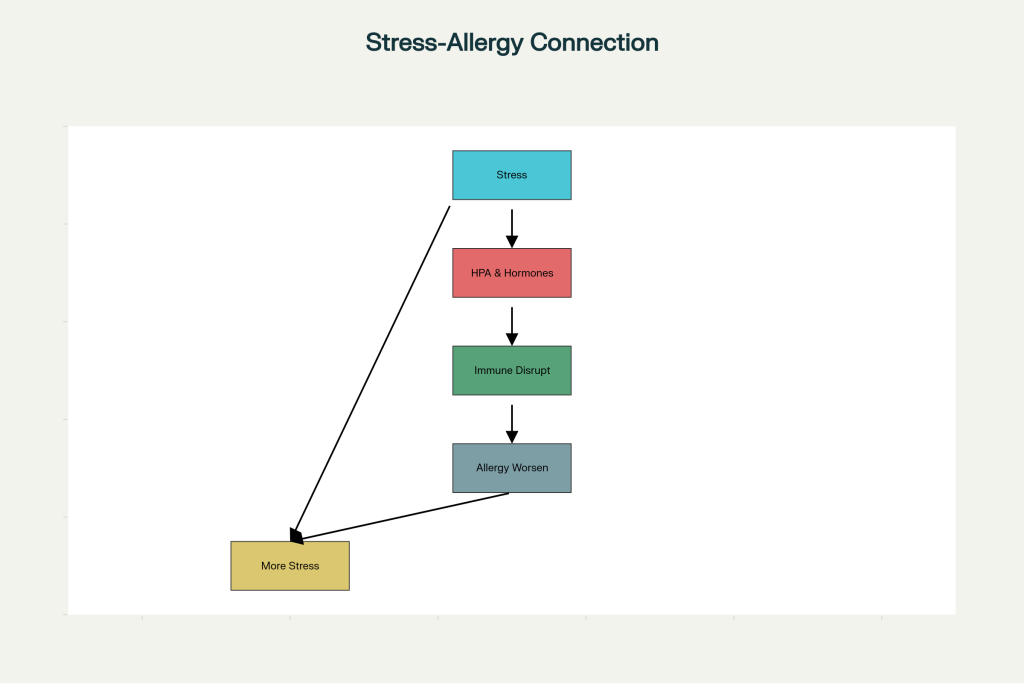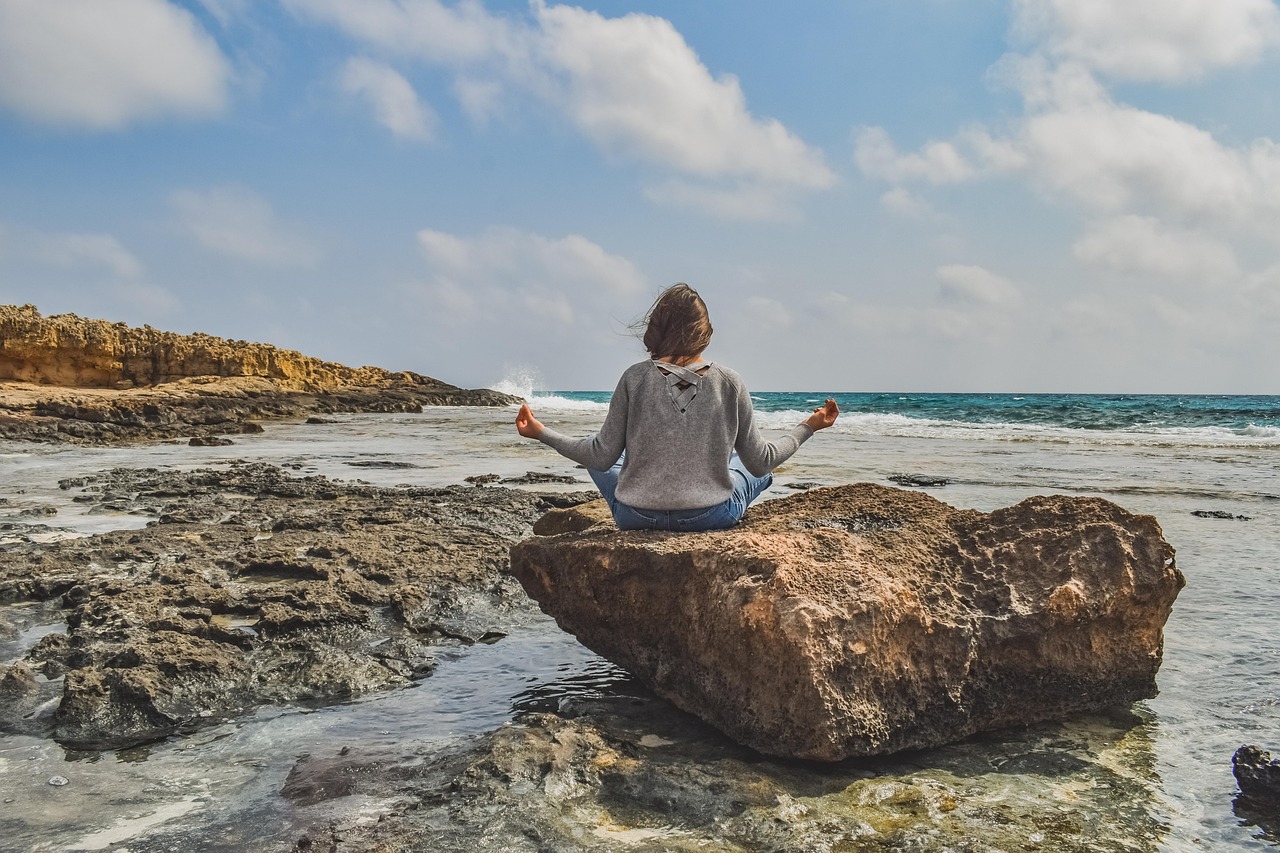Sometimes you might wonder where your symptoms of joint, muscle pain comes from, you were good with diet, sleep, so why it suddenly gets worse? The cause can be stress. Emerging research reveals a powerful interplay between psychological stress and the severity of allergy symptoms. Even diligent management of diet, sleep, and lowering environmental exposures may be influenced by stress, triggering allergic reactions in ways you may not expect. Below, we dive deeply into what science—and people on social media—says about the link between stress and allergies, along with practical strategies to break the cycle.
The Mind-Body Connection in Allergies
When your immune system overreacts to triggers like pollen, the result is classic allergy symptoms: congestion, sneezing, and inflammation. The body’s stress response activates the hypothalamic-pituitary-adrenal (HPA) axis and releases stress hormones (including cortisol and adrenaline), which in turn can ramp up the already exaggerated immune reaction seen in allergies.
Physiologically, stress:
- Alters immune cell behavior, often suppressing cells responsible for anti-inflammatory action
- Increases production of pro-inflammatory signals in the body
- May prolong or worsen inflammation after allergen exposure
When stress is chronic, these physiological effects do not simply fade after the stressful event but can “prime” the immune system, creating susceptibility to flares or even inducing new sensitivities / food intolerances.

Stress Is a Two-Way Street
Not only does stress worsen allergies, but living with allergy symptoms is itself stressful. Poor sleep, chronic congestion, and pain reduce quality of life and create negative mood loops, leading to even more reactivity over time. This stress-allergy feedback loop is a key reason why so many people report symptom spikes during emotionally charged periods, even when their lifestyle and exposure haven’t changed.
What the Science Shows
- Human studies show that people with allergies have heightened physical stress responses. For example, after a stressful event, individuals with allergies exhibit sharper spikes in cortisol than healthy controls—yet may not always feel subjectively more stressed. They tend to suppress emotion more and recover slower from physical stress, unless they consciously reframe (reappraise) their experience.
- Animal and lab studies confirm that stress directly alters immune regulation, leading to worse skin inflammation and more severe symptoms in stress-exposed allergy models.
- The psychological side: Allergy sufferers are more vulnerable to anxiety and depression, especially if symptoms disrupt sleep, work, or enjoyment of daily life.
Social Media Insights
Recent Reddit and community discussions reveal three key patterns:
- Many people trace their allergy flares or first symptoms to high-stress life events. New jobs, moving, exams, or emotional upheavals often spark the start of chronic allergy issues.
- Exacerbation during stress: Those already diagnosed commonly report “mystery flares” that get much worse during periods of worry, workload, or family stress. Stressful days often lead to new hives, more swelling, or more food reactions, sometimes irrespective of exposure.
- Vacation magic: Perhaps most striking, countless users reveal that vacations or time away from daily stressors bring major relief. Even diet restrictions may loosen—the body handles previously problematic foods or environments better when relaxed and happy.
A typical comment: “When I’m on vacation enjoying myself, I get much less symptoms or can eat whatever food I like. But after a stressful week, everything seems to set me off again.”
Destress and Relieve: What Actually Works?
Based on both scientific findings and community reports, here are some powerful techniques that reduce stress and—potentially—lessen allergy symptoms:
1. Remove Toxic People
Cutting out toxic relationships and limiting exposure to negativity is a form of “allergen avoidance” for the mind. Many in allergy groups say that not only do their symptoms ease, but their overall resilience improves when they’re surrounded by supportive, calm people.
2. Spend Time in Nature (Mindfully)
Nature exposure is a paradox for those with pollen allergies, but for many, mindful time outdoors—especially on low-pollen days or in less allergenic environments—profoundly boosts mood and reduces reactivity. Forest walks, time by water, or even gardening (with a mask) help break the cycle of stress, inflammation, and sensitivity.
3. Breathing Techniques
Deep breathing, alternate nostril exercises, and slow abdominal breathing have been repeatedly cited as quick destressors. These practices not only calm the mind, but may directly impact the immune and nervous system circuits that underpin allergies.
- Try inhaling through one nostril, exhaling through the other—repeat for five cycles.
- Guided breathing apps are widely recommended in Reddit threads.
4. Meditation and Mindfulness Apps (e.g., Plum Village)
Daily meditation brings significant stress reduction. The Plum Village app, headspace, and Calm are recommended by both clinicians and allergy sufferers for their short, accessible guided tracks. Even short bouts (5–10 minutes) can shift you out of “fight or flight” and into a restorative mode.
5. Yoga, Exercise, and Routine
Moving your body reduces stress hormone levels over time. Yoga, in particular, has clinical evidence backing both its anti-inflammatory and decongesting powers, as well as its mental health benefits, which leads to better sleep and more symptom-free days with regular movement.
https://pmc.ncbi.nlm.nih.gov/articles/PMC10123236/
https://www.health.harvard.edu/diseases-and-conditions/is-stress-making-your-allergy-symptoms-worse?
https://www.emjreviews.com/…/how-stress-worsens…
fbclid=IwY2xjawNiiq5leHRuA2FlbQIxMABicmlkETF1NU1GbVZxNjhUVFZocU9oAR6xd0rQN1f76B0whBj3C339koYQr4bC5N5-Kjkqylm7ritCTijF-UI6IokBrA_aem_EssqCP0XBXEgbAiA78w3Dw
https://www.wyndly.com/blogs/learn/anxiety
helpful link : https://www.reddit.com/r/Meditation/



Leave a Reply